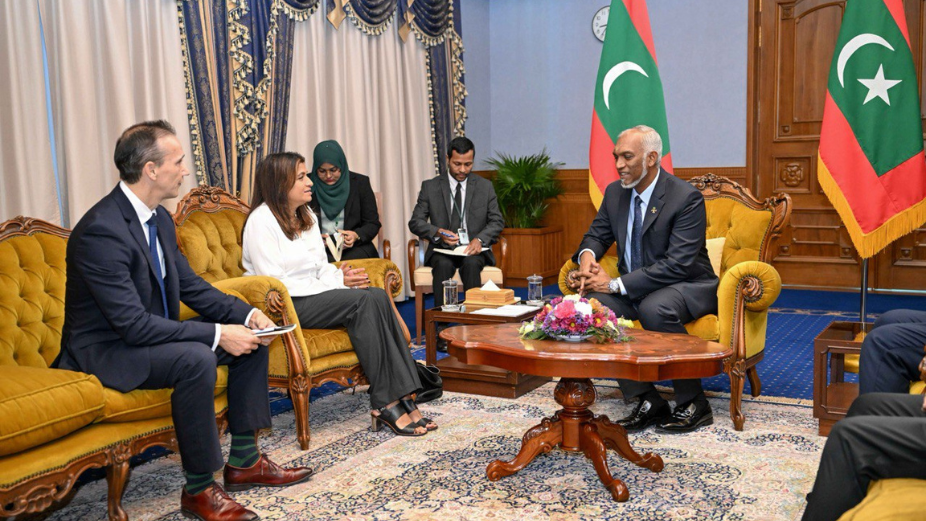
President Dr. Mohamed Muizzu has announced that the newly established Development Bank of Maldives (DBM) will serve as a central hub for investment across various sectors of the Maldivian economy, including tourism, real estate, and housing. This announcement follows a meeting held at the President’s Office on Monday, where President Muizzu met with the Chairperson and CEO of the DBM, Aruni Goonetilleke and Noel Gregor Paterson-Jones.
During the meeting, President Muizzu, alongside the Chairperson and CEO of DBM, engaged in a productive discussion focused on improving and diversifying the Maldivian economy. The discussion leveraged the extensive knowledge and experience of both Goonetilleke and Paterson-Jones in global financial markets and green investments.
Chairperson Aruni Goonetilleke brings over 25 years of experience in global financial markets, specialising in business origination, governance, credit assessment, and risk management in emerging markets. Her background includes transformational roles in corporate banking, credit, risk management, and internal auditing across international and Sri Lankan banks. She holds a Master of Laws (LL.M) from Harvard University.
CEO Noel Gregor Paterson-Jones has been a key figure in green investments, leading the investment teams and functions in the establishment of the National Infrastructure Fund. He also chairs the Electric Vehicle Africa Fund and manages clean energy projects in Southeast Asia, demonstrating his expertise in green finance and infrastructure development. He holds a Master of Philosophy (MPhil) from Oxford University, U.K.
President Muizzu stated that the primary purpose of the DBM is to diversify and expand the Maldivian economy, noting that the bank will play a crucial role in driving investment in key industries. “The CEO and chairperson selected both have extensive experience in financial institutions across the world,” he said, pointing to the calibre of leadership expected to helm the institution.
The President outlined the sectors that will benefit from the DBM, describing its role as an investment hub for the tourism industry, the renewable energy sector, and the real estate and housing market. He also noted that the bank’s establishment is a fulfilment of one of his key electoral pledges aimed at creating a robust financial institution focused on supporting new businesses and industrial activities within the country.
The establishment of development banks is common in many countries, where they act as primary lenders for new ventures and provide loan facilities to support business startups and economic initiatives. The DBM, according to President Muizzu, will be no different, focusing on the introduction of new businesses and the expansion of economic activities in the Maldives.
The formation of the DBM was authorised by President Muizzu under the powers vested in him by the Companies Act, with the bank officially incorporated on May 16, 2024. The Economic Ministry subsequently applied for a license to operate the DBM with the Maldives Monetary Authority (MMA) on July 28. On August 21, three members were appointed to the bank’s board: Ahmed Ali, Saeed Abdul Nasir Bin Saeed Hassan Al-Junaid, and Robert Daniel Kant.
While the establishment of the DBM is seen as a major step towards economic diversification, the real test will be in its implementation and operation. The success of the bank will depend on its ability to attract and manage investments effectively, particularly in a small and developing economy like the Maldives. There will also be a need to ensure that the bank’s operations align with the broader economic goals of sustainability and inclusive growth, avoiding any unintended pressure on the existing financial system. The coming months will be crucial in determining how well the DBM can fulfil its intended role in the Maldivian economy.











